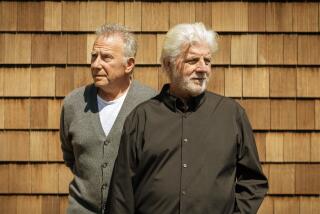Author of ‘Fatal Vision’ Betrayed Him, Killer of Wife, Daughters Says
- Share via
Testifying in court for the first time since his trial for the murder of his wife and two daughters, Jeffrey MacDonald said Thursday that he felt betrayed after he signed a contract to have a book written about the case to “tell the true story of a false prosecution.”
Frequently breaking into tears, MacDonald, who is serving three consecutive life terms for the murders, said he hoped “Fatal Vision” author Joe McGinniss would write a “fair and accurate book” about his love for his family and the unfairness of the charges against him.
The testimony came in MacDonald’s $15-million Los Angeles Federal Court lawsuit alleging that McGinniss misled him into sharing intimate confidences and documents during the 1979 murder trial by falsely proclaiming belief in his innocence.
Changed His Mind
McGinniss, who said he became gradually convinced of MacDonald’s guilt as he considered the evidence in the case, argues that MacDonald was simply unhappy because the book concluded he was guilty. He has filed a countersuit against the former Long Beach physician, alleging that MacDonald breached their contract by cooperating with another writer after “Fatal Vision” was published.
In his testimony Thursday, MacDonald, 43, said he talked about signing a contract for a book to help pay his mounting legal bills and because he viewed it as “a possible mechanism of getting some reasonable information out” about the case.
After negotiating briefly with writer Joseph Wambaugh, MacDonald said, he settled on McGinniss, in part because he believed McGinniss was “big enough to stand up to” pressure from the government to portray him as a killer.
Gained His Confidence
As the trial in Fayetteville, N.C., progressed, MacDonald said, McGinniss gained his confidence and led him to believe he was on his side.
At one point, MacDonald said, he was furious with one of the judge’s rulings, and McGinniss told him: “Don’t just get angry. Give me your feelings. I have a book to put it in. You have a book to sell.”
MacDonald said McGinniss visited him in jail a few days after the conviction and they embraced.
“He told me that he wouldn’t rest until I was home again,” MacDonald testified, his voice breaking. “I believe I was crying. I don’t believe I said anything. . . .
“He told me the decision was outrageous, that he couldn’t wait till I was running on the beach with him again. He told me he thought the judge was a maniac.”
Thought They Were Friends
Through months of intimate interviews, the two had apparently become best friends, MacDonald said. As news reports suggested that the book would be less than favorable, McGinniss denied that would be the case, he said.
“He said publishers have a way of leaking information that generates interest in a book prior to publication, and it isn’t always accurate,” MacDonald recalled.
“He said, ‘I myself am furious about this, and I’ve just gotten off the phone’ expressing his contempt for the article (in Publishers Weekly) and his anger at it. . . . He said, ‘Jeff, by now you must understand, these things are publishers’ hype.’ ”
MacDonald said he became engaged during his brief period of freedom, before the U.S. Supreme Court reaffirmed his conviction in 1982, and phoned McGinniss to invite him to his engagement party. The author declined, he said.
“He said he would love to,” MacDonald testified, “but he was too busy getting out the book that would be my ultimate vindication.”
More to Read
Sign up for our Book Club newsletter
Get the latest news, events and more from the Los Angeles Times Book Club, and help us get L.A. reading and talking.
You may occasionally receive promotional content from the Los Angeles Times.










